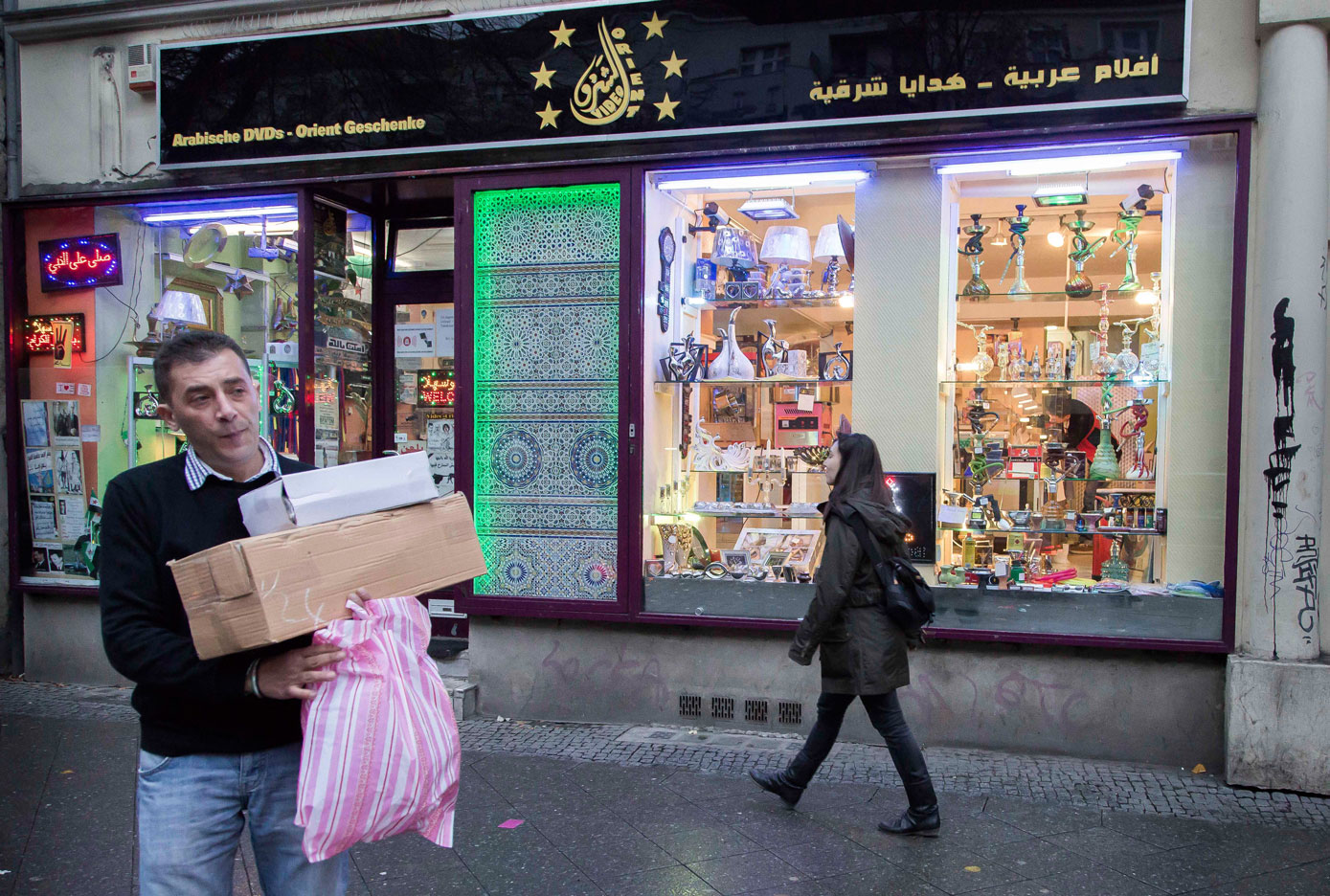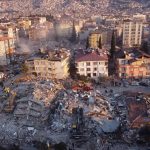Cousin!” A familiar voice rings out from down the street as I turn a corner in Berlin to meet Sam, one of my dearest friends. “Cousin!” I shout back, my arms outstretched with joy at seeing a familiar face in a foreign city.
Sam and I first met in Beirut almost 10 years ago and immediately felt like family. We decided that, between his being Syrian and my Lebanese roots, we probably were family — at some point, anyway. Whenever we see each other, it feels like no time has passed at all, even though I have married and settled down in one place in a way that would make my former roving-correspondent-self bristle. Sam has moved to Germany and now has a child who can talk.
I’m in Berlin for the weekend — a trip that I almost didn’t take after my husband, Salem, and I spent the previous two weeks rattled by the 7.8 magnitude earthquake that struck the part of the world (Turkey) where we fell in love, and where he still has family. I almost made an excuse not to attend the conference in Berlin at which I had been invited to speak, but the knowledge that I would see friends like Sam dragged me out of the house and onto the plane.
Sam and I sit down in a Turkish restaurant and manage to get through a plate of mezze and half a kebab before I broach the topic. “I always hate February,” I said, “but this February?” We look at each other, knowingly.
“The earthquake,” he said, shaking his head.
“Did whoever is controlling this whole experiment get so bored that he just had to kill 50,000 people in one go?” he continued. We are testing out new material on each other, like two comedians backstage at an open mic. Both of us have a penchant for dark humor, but a natural disaster that devastated the corner of the world that brought us together provided a challenge, even for us.
It reminded me of earlier in the month when, after a few hours of frantically trying to get hold of his family in southern Turkey, Salem had almost immediately started cracking earthquake jokes. “Don’t forget your keys,” he told me. “We don’t want any more of my family to sleep in the street tonight.” His delivery was so deadpan that I had to triple confirm that he was joking. I wasn’t quite ready for earthquake humor, even if it was his coping mechanism. But a few days later, we were crossing the street on our way to a friend’s birthday party when we almost got hit by a bus.
“It would be really inappropriate of us to die this week,” I said, turning to him. We smiled at each other for the first time in a week.
“You have to figure out a way to laugh, if you can,” Sam comments, laughing in recognition. “What else are you going to do?”
It is lightly snowing the next day, when I walk down to Berlin’s Neukölln district, which, while historically home to Turkish and Kurdish people who immigrated during the 1960s as guest workers, has now become the stomping ground for Syrian refugees. The latter came to Berlin after 2015, when then-Chancellor Angela Merkel waived the Dublin Procedure (which required refugees to seek asylum in the first EU country where they were fingerprinted) for Syrian refugees. This enabled Syrians to seek asylum in Germany even if they had been fingerprinted elsewhere.
As soon as I turn onto Sonnenallee — or, as it is colloquially known, the Arab Street — the smell of slowly roasting farouj hits me and the sound of Arabic chatter transforms the foreign into something far more familiar. Not only is there an abundance of Syrian restaurants and shisha cafes, there are even establishments that cater to cravings as specific as Idlibi sweets and Damascene ice cream. I wander into one of them to meet my friend Ansar.
“The Syrian community is really coming together to help, even when they can’t go [to earthquake-destroyed areas in Turkey and northern Syria] themselves,” she told me. We are sitting at a table, surrounded by friends drinking coffee and sharing shisha pipes. Ansar has worked with Syrian civil-society organizations since I first met her in Beirut and, true to character, seems to know everyone who is organizing aid for the earthquake now. “For example, some are helping people in affected areas find places to stay in unaffected areas, and coordinating from here,” she continues.
A few days after the earthquake, the German Foreign Ministry announced that it would be fast-tracking temporary visas for earthquake survivors with family members who had German citizenship or permanent residency. Given that Germany is home to the world’s largest Turkish diaspora and one of its largest Syrian diasporas — now numbering 3 million and 800,000, respectively — the news came as a welcome announcement. It provided a sliver of hope for families who had been separated for many years, due to the war. Perhaps they would finally be able to reunite, albeit under terrible circumstances.
“A lot of people started looking into the process and seeing what they needed to do,” Ansar’s friend Rawia explains, taking the shisha from her. But this was when they began running into bureaucratic hurdles. Not only must someone hoping to be granted a visa provide proof of residency in one of the disaster-hit regions, but they must also give proof of previous residencies, to demonstrate they were physically present there at the time of the earthquake.
Adding insult to injury, they also have to provide a written statement explaining why they would like to leave the disaster-struck areas, in addition to providing proof of things like health insurance. A sponsor must ensure that they won’t need financial support from the German government. And, of course, they must produce a passport. Many of the people who had to leave their homes as they came crashing down had no time to think about the bureaucracies that they might need to navigate, on the off chance that they survived. Many passports are still buried under the rubble.
“Now we just found out that Syrians won’t be eligible at all,” Rawia continues. While many had suspected that the bureaucratic hurdles would be too great for most Syrians who are still living in Syria (and do not have access to foreign embassies, as a result of the war), there was some hope for the Syrians living in Turkey, who were equally affected by the earthquake. But, the day before, the German Foreign Ministry confirmed that the fast-tracked visas were for Turkish nationals only. “They know that the Syrians wouldn’t leave,” she said, explaining that most Syrians living in Turkey have a residency permit called a “kimlik,” which doesn’t allow them to leave the country anyway. “How can you leave [Germany] after three months if you don’t have anywhere to go back to?”
Since I spoke to Rawia, there has been a pleasant surprise: Of the 500 visas that were issued, an unexpected number have gone to Syrian nationals, who will now be able to reunite with family members in Germany. Still, her pessimism is understandable, particularly given how often the German government has left its Syrian community out in the cold. After Merkel’s government welcomed more than 1 million refugees, most of whom were Syrian, to Germany, subsequent governments began cracking down on the family reunification policies that many were hoping to use to bring their families over through legal — and, more importantly, safer — routes. First they delayed and then they suspended the right of permanent residents to sponsor relatives.
“I tried so hard to forget about what happened in Syria,” said Ammar, a 35-year-old medical student and Rawia’s husband. “I didn’t have any more energy to keep following the news. I just wanted to focus on my studies and disconnect from the people that I used to know.”
Yet, as soon as the earthquake struck, he couldn’t look away. “I just knew so many people who were affected,” he continued. “So many people who had died.”
Now a German citizen, Ammar was recently able to join a 10-day humanitarian mission to affected areas of southern Turkey and northern Syria to assist search-and-rescue workers on the ground. “Here is the problem,” he told me, leaning forward in his seat. “A lot of the people who are in charge of the organizations that should be helping on the ground have been affected by the earthquake, and these institutions have been affected. When we entered Syria with medical supplies, they didn’t know what to do because there was no one there who was authorized to make the decision.”
Over the next 10 days, Ammar assisted both Turkish and Syrian doctors performing complex surgeries on people who had been rescued from the rubble. “The doctors are excellent, but they do not have enough supplies,” he said. But one of the things that struck him the most was the reaction of survivors. “People are afraid of entering buildings and afraid of going back to their homes to collect their belongings,” he told me. “So many people know people that died under the rubble that they prefer to sleep in tents, even though it is cold outside.”
Listening to Ammar recount his recent trip prompted me to remember the first time I visited Gaziantep — and later, Hatay — in 2015, when I had just moved to Istanbul. At first, it felt as if these cities were safe havens where people could seek refuge from the fighting but still remain connected to Syria, whether it be to check on family members and property or to keep the hope alive that they might one day be able to return home. You could feel the porousness of the border, as Arabic filled the streets and Syrian restaurants started to overtake Turkish ones — not unlike Sonnenallee today.
Even then, those who could were already starting to leave, following the mass exodus of people crossing the sea, hoping to seek asylum in Europe. For those who stayed in Turkey, life became more difficult. First, the Turkish government closed the border between Turkey and Syria, effectively separating families and leaving Syrians who hadn’t yet left Syria stranded in a war zone. Next, it began requiring Syrian refugees to ask for permission to travel around the country, effectively trapping people in the localities where they first registered, meaning that someone in Hatay or Gaziantep couldn’t even move freely to Ankara or Istanbul.
“You know, these used to be the cities of the Syrian refugees,” says Sami, a friend of Ammar who is also sitting with us. “Now, there are more than 2 million Syrians who are homeless, who will be homeless for at least one year.” Even though the Turkish government is planning to build a number of new apartment blocks in the affected cities, Sami suspects that these will be offered to Turkish citizens.
“Now there is no work, so this is another layer of this catastrophe,” Sami continued, explaining that even those who were able to secure well-paid jobs with international NGOs and often sent money to family members still living in Syria now have no way to support their families. Without support from the government, this puts more pressure on family members who have left the Middle East to fill in the gaps.
“We can send $300 here and there, but it isn’t going to make much of a difference,” Sami continued. Already, the cost of rent in cities that weren’t affected by the earthquake, like Istanbul and Ankara, has doubled (at least), creating a housing crisis further exacerbated by inflation as well as racism. Mother Nature may not discriminate but, in poorly made houses, landlords who gauge their prices on passports and papers do, as do governments that decide which nationalities are and are not worthy of relief.
“What is sad is that when most people left their homes, the first thing that they took with them was their papers,” said Sami, remembering a news report in which a woman had escaped with only her daughter and her passport. “If an earthquake happened in Berlin right now, I would just grab my daughter and leave,” he continued. “But that is because I have … German papers now; I know I can get them replaced. What are you supposed to do when you have a government that doesn’t take care of you?”
Later that evening, I made my way to a small music venue in Prenzlauer Berg. It was a Saturday night in Berlin, after all, and while people across the city were doubtless lining up to go to one of the city’s famous nightclubs, I was on my way to Adira, a queer Arabic dance party that has been refashioned into an earthquake fundraiser. “It was a bit unusual to host a party during such a tragedy,” Zuher Jazmati, Adira’s co-creator and the party organizer, told me. “We were asking ourselves, how should we deal with this situation when our communities are suffering?” Rather than cancel the party, Jazmati decided to make it a fundraiser and donate the proceeds to rescue and relief efforts on the ground.
I befriended a Turkish girl at the bar, and she smiled as the sounds of famous Arabic pop songs filled the room. “I don’t understand the words, but I can feel the music,” she laughed. I knew exactly what she meant, as I feel the same way about Turkish music. Even if I can’t understand the lyrics, the rhythm feels familiar and shared — like Arabic spoken in Gaziantep or the smell of slowly roasting farouj in Neukölln. Far away from the places that feel like home, these sounds and smells are like familiar faces in a foreign land.
As I wandered back to my friend’s apartment in the wee hours of the morning, I found myself wondering why some cities stay standing while others fall apart. What does it take for a city to rebuild and heal its wounds? Berlin was once a war zone, a divided city with stories of people separated from their loved ones, sheltering from bombs and being smuggled to safety. Now, it is a refuge — though not always a kind one — for people who fled these experiences much more recently. I wonder if, someday, the corner of the world that is so close to our hearts could be rebuilt into a place that felt like a place of safety and refuge as well.
By: Anna Lekas Miller
Source: News Line Magazine



